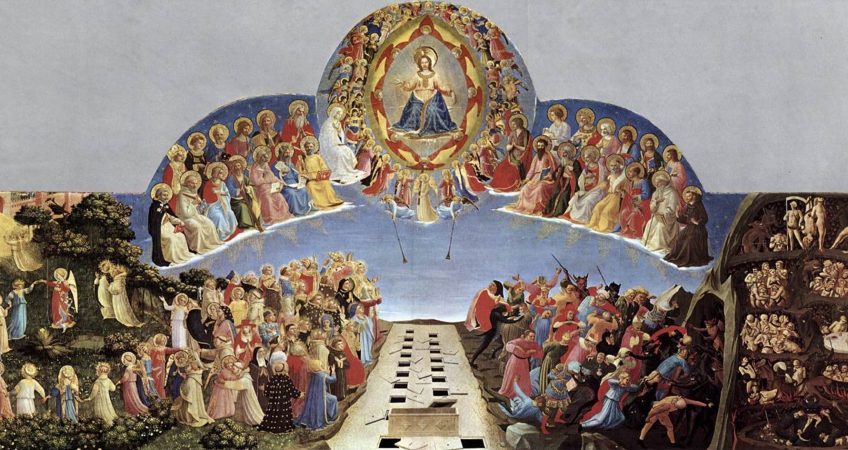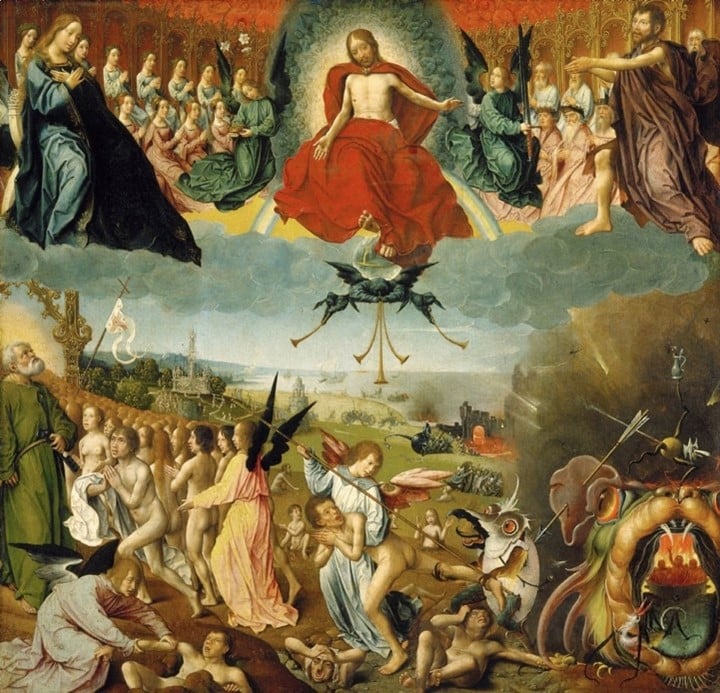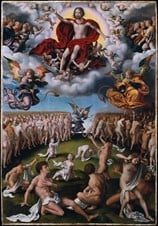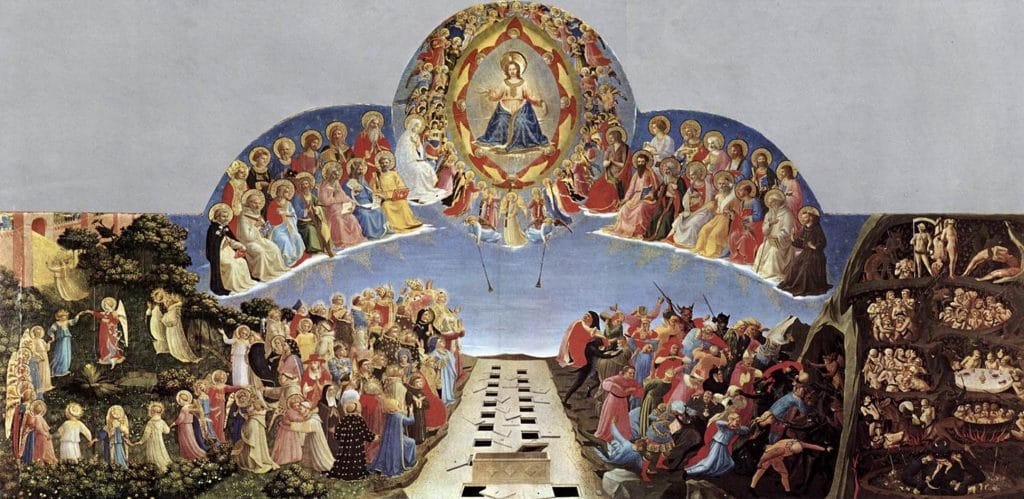HOMILY FOR PONTIFICAL MASS FOR THE SOLEMNITY OF OUR LORD JESUS CHRIST KING OF THE UNIVERSE (YEAR A)

St. Mary’s Basilica, Sydney, 22 November 2020

Death, judgment, heaven and hell: there are the four last things. Purgatory is in there, too, as the anteroom to heaven. For weeks past and still to come we’ve been encouraged to think about death – what St Paul calls today “our last enemy” (1Cor 15:20-28); about heaven – the place for those he says “belong to Christ”, where psalmist says God has prepared a banquet for them (Ps 22(23)); and about hell – Paul’s place for “the enemies of Christ”, described by Jesus today as “the eternal fire for the accursed” (Mt 25:31-46).
But in-between comes judgment. It’s not a popular idea these days, outside the legal profession. We don’t like ‘judgey’ or judgmental people who import truck-loads of high moral ground from which to wag their fingers at others as if they were perfect themselves.
So when we hear in our Gospel today that Christ will return as king and judge, on a seat of power but also of judgment, as a shepherd gathering the sheep but also expelling the goats, it is somewhat confronting (Mt 25:31-46). It is challenging enough to be told to visit, feed, clothe and welcome the needy; to be told our eternal destiny depends on it can seem plain threatening. Yet it is our Catholic Faith that “Death puts an end to human life as the time open to either accepting or rejecting the divine grace manifested in Christ” and that there is a particular judgment where each is “rewarded immediately after death in accordance with his faith and works” (CCC 1021-22).[1] As St John of the Cross said “At the evening of life, we shall be judged on our love.”[2] As well as our particular judgment at death, there will be a last or general judgment at the end of time and Resurrection of the Dead, when Christ will return as Truth and Justice and Glory, and all be laid bare before Him (CCC 1038-41).[3]
Because of our unease with death, judgment and hell, the Church gives us November each year to think about such things and then Advent to prepare for them. Over the past few weeks I’ve tried to show how in God justice and mercy are not rivals as they can be in us. Indeed, the history of salvation might be viewed as the interplay of divine justice and mercy in the face of human rebellion and return, coming to its climax in the four last things.

So how are we to approach the prospect of our own judgment? My thought for you today is that we should face it with that ‘fear of the Lord’ that is ‘the beginning of wisdom’ (Prov 9:10), but also with that ‘hope in the Lord’ that is its end. Rather than going through life with a gothic horror story at the back of our minds, we should see the Judgment as the consummation of a love-story, the story of God and humanity, of Jesus and each soul.
Our Gospel today describes the private and public dimensions of this, the particular judgment and the general. We know what we’ve done and what was in our hearts, but we’re not the best judges in our own case. Christ also knows – and He is the best of judges. On that Day when all is revealed, it will be plain for all to see who cared and who did not, the sheep and goats. That makes us tremble, but is also a cause for hope.
Why do I say it is cause for hope? Well, first, because only at the Last Judgment will there be redress for the grave injustices of history that we are powerless to make right: the dispossession of Aborigines, the holocaust of Jews, the abuse of little ones. We can sometimes punish perpetrators and offer redress to survivors, but we cannot undo the harm done. Without a final judgment, as Pope Benedict observed, such injustices remain forever. Christ’s second coming, however, makes things right for the victims, and indeed for the rest of us who may feel polluted by some past injustice or beneficiaries of it. “God can bring justice in a way we cannot conceive,” the Pope observed, “yet we can begin to grasp it through faith. Yes, there is a resurrection of the flesh. There is justice. There is an ‘undoing’ of past suffering, a reparation that sets things aright. For this reason, faith in the Last Judgement is first and foremost hope.”[4]
Secondly, that hope is not just for an eventual balancing of the books: no, it promises a transformation, when in the face of eternal Truth and Goodness and Beauty, all that is right shines with reflected light and all that is rotten falls away. Those who have destroyed their desire for truth and made everything a lie, who have suppressed all love in themselves and lived for hate, will be free to continue their hellish choice to separate from God.[5] But for the rest, including the morally and spiritually wounded who are most of us, there will be purgation in the fire of truth, healing in the warmth of love, preparation for eternal union.

So the doctrine of the Judgment need not frighten us: it is vindication for the innocent and hope for those open to purification. But there’s a third reason to greet Christ’s return as judge with excitement more than trepidation. In our first reading and psalm God is compared with a judge who separates sheep and goats, but who also guides, rescues, feeds and bandages (Ezek 34:11-17; Ps 22(23)). Ezekiel’s shepherd-God stands not at a distance but right “in the middle” of His sheep, to keep them all in view. Reflecting on this text in His self-description as the Good Shepherd (Jn ch. 10) but also in today’s prophecy of Judgment Day, Jesus calls His flock “brothers and sisters of mine”, says people will be judged by what they did for “the least of these”, and regards what’s done for them as done to Him. He stands in the middle of us; His identification with us is complete; He is one of us.
So, when we care for each other and especially the most needy, we see the face of Christ; and when He judges us, He sees Himself in us. “Come, you carers for the poor and strangers,” for they are me, St Hippolytus hears Jesus say. “Come, you who fostered love, for I am love. Come, you who shared peace, for I am peace.”[6] You are my own flesh and blood, my brothers and sisters, my look-alikes. If that is how the Universal King and Just Judge thinks of us, we can trust His judgment will be merciful.
When Christ came at the first Christmas it was joy to the world; when He returns, at that second Christmas that is the Last Judgment, it will be joy to the world again. By our faith and action we will fit ourselves to enter into that celebration – or not. As we celebrate the first coming, then, we prepare for the second. For, along with the merciful doctrines of death, heaven, purgatory and hell, we have the merciful doctrine of Judgment. It is on Judgment Day that we work and hope and pray to hear those precious words: “Come, blessed of my Father, receive the inheritance prepared for you since the foundation of the world.”
ANNOUNCEMENT IMMEDIATELY AFTER THE AGNUS DEI
Before Genuflecting
Because current circumstances continue to impede attendance at Mass and reception of Holy Communion, I invite those who are joining us by live-streaming to ask God that by spiritual communion you might receive the graces of sacramental communion. Offer this Mass and your hunger for the Eucharist for the safety of your loved ones, of yourselves and of our world.
[1] CCC 1021-22 citing Mt 16:26; Lk 16:22; 23:43; 2Cor 5:8; Phil 1:23; 2Tim 1:9-10; Heb 9:27; 12:23; Council of Lyons II (1274): DS 857-8; Council of Florence (1439): DS 1304-6; Council of Trent (1563): DS 1820; Benedict XII, Benedictus Deus (1336): DS 1000-1; John XXII, Ne super his (1334): DS 990; cf.
[2] St John of the Cross, Dichos 64.
[3] CCC 1038-41 citing Mt 25:31-46; Jn 5:28-9; 12:49; Acts 24:15; 2Cor 6:2; 2Thess 1:10; Tit 2:13; St Augustine, Sermo 18.
[4] Pope Benedict XVI, Spe Salvi, 43 http://www.vatican.va/content/benedict-xvi/en/encyclicals/documents/hf_ben-xvi_enc_20071130_spe-salvi.html
[5] Pope Benedict XVI, Spe Salvi, 43 http://www.vatican.va/content/benedict-xvi/en/encyclicals/documents/hf_ben-xvi_enc_20071130_spe-salvi.html
[6] St. Hippolytus, On Christ and the Antichrist, I, 43
Welcome to St Mary’s Basilica in Sydney, whether physically or virtually, for the Solemn Feast of Christ the King. As our liturgical year comes to its close, we celebrate the One who rules in our Church and our hearts, and after a year of ups and downs, we greet His second Advent with hope and excitement.
During today’s Mass four of our young choristers [Adrian Nguyen, Skyler Gacho, Bryan Christian, Nicholas Ho] will be confirmed and I acknowledge them, their sponsors, families and friends.
To be able to celebrate this sacrament together is a great joy after so many months of anxiety and restrictions. Unfortunately much tougher restrictions have generally been imposed by health authorities upon places and activities of worship than on comparable venues and activities. Last month’s much-vaunted ‘easing of restrictions on churches’ turned out to be illusory, as it only applied to cathedrals and megachurches; in most places the situation regarding indoor Masses remains as restrictive now as it has been for months.
But I’m pleased to report that from tomorrow (23 November) we can have up to 500 people at outdoor Masses, and though we are still being treated as more germy than concert goers or footie fans, we are at least now on a par with the hospitality industry and protest marches. Hopefully by Christmas we’ll be allowed more inside churches as well and, with a mixture of indoor and outdoor Masses, we’ll be able to include everyone. Please keep praying that there is no spike in COVID cases in the meantime.
Conscious that the sacraments of Baptism and Confirmation call us to let Christ reign in our hearts and lives, we repent of the times that we’ve failed to live as citizens of His kingdom…

